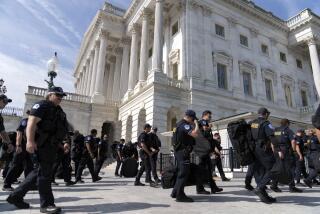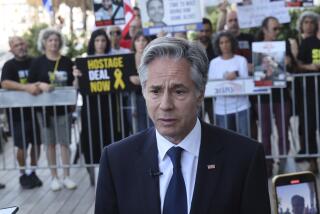Congress Welcomes Bush’s Offer to Iraq : Reaction: Lawmakers say the President’s proposal matches their mood and that of the country.
WASHINGTON — Members of Congress welcomed President Bush’s efforts Friday to open high-level talks with Iraq as a sign that he is heeding the mood, both in Congress and the country at large, that the United States should not rush to war in the Persian Gulf.
Their enthusiasm was tempered, however, by concern that pressure to go to war will increase if the talks fail. And several key Democrats said Bush cannot make a convincing case for the use of force until economic sanctions have been given ample time--at least a year--to work.
“Before we commit our military forces, we need to have the commitment of the nation,” said Senate Armed Services Committee Chairman Sam Nunn (D-Ga.). “I welcome this change in the Administration’s policy . . . but it doesn’t change my evaluation. . . . War should be the last resort after all other options have failed.”
Bush told a news conference that he has no plans to summon lawmakers back into a special session to debate the gulf crisis this month.
“I’d love to see Congress pass a resolution enthusiastically endorsing what the United Nations has done,” Bush said, referring to Thursday’s vote by the U.N. Security Council authorizing use of force if Iraq has not agreed to withdraw from Kuwait by Jan. 15, 1991.
But noting that he wants to avoid “a hand-wringing operation that would send bad signals” to Iraq, Bush said: “What I don’t want to do is have it (Congress) come back and end up where you have 435 voices in one house and 100 in the other saying what not to do.”
Although several Republican senators who support the idea of calling a special session said they think Bush might change his mind later, other lawmakers said after meeting with the President on Friday that the proposal appears to be dead.
Expressing the consensus view, Sen. John Glenn (D-Ohio) said no one is “going to vote for any resolution until they see what comes out” of the talks with Iraq.
Bush, surprising lawmakers with his overture to Iraq, said he has invited Iraqi Foreign Minister Tarik Aziz to meet with him in Washington during the week of Dec. 10 and offered to send Secretary of State James A. Baker III to Baghdad before Jan. 15 to meet with Iraqi President Saddam Hussein.
But Bush also made it clear that, while he is willing “to go the extra mile for peace,” the talks could not result in “anything less” than total Iraqi withdrawal from Kuwait, restoration of the deposed Kuwaiti government and release of all hostages now held by Iraq.
“I welcome this course correction by the President,” said Sen. Alan J. Dixon (D-Ill.), a member of the Senate Armed Services Committee, which has been conducting hearings on the Administration’s gulf policies. “I hope it is an indication that the President is back to the defensive posture . . . from which (he) seems to have strayed in recent weeks.”
Sen. Edward M. Kennedy (D- Mass.), another committee member who has been sharply critical of Bush’s policies, praised the President’s decision as a sign that the Administration finally recognizes that “neither Congress nor the country is ready to go to war in the Persian Gulf.”
Kennedy cautioned, however, that the talks should not be used as a pretext for going to war in the event they fail. “Going the true extra mile means giving sanctions adequate time to work. The Jan. 15 fuse for war is still lit,” he said.
Privately, a number of lawmakers and congressional aides expressed concern that Bush’s offer to open a dialogue with Iraq might be designed as much to sway members of Congress as to influence Hussein.
That belief was clearly reflected in a meeting of several key Republican senators shortly after the President’s announcement, according to a source familiar with the discussions.
“Most everybody said they thought this was a great idea because it would take the wind out of the sails of those (Democrats) who are trying to portray the President as a war-monger,” the source said.
Nunn, echoing sentiments expressed by other senior Democrats, agreed that Bush’s announcement will “add to his credibility” on Capitol Hill, where support for the President has been eroding since his announcement last month that he was doubling the initial deployment of more than 200,000 troops to the Persian Gulf.
Times staff writer Paul Houston contributed to this report.
More to Read
Get the L.A. Times Politics newsletter
Deeply reported insights into legislation, politics and policy from Sacramento, Washington and beyond. In your inbox three times per week.
You may occasionally receive promotional content from the Los Angeles Times.










